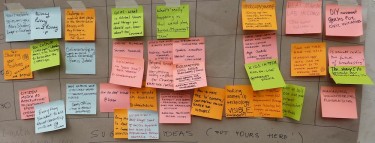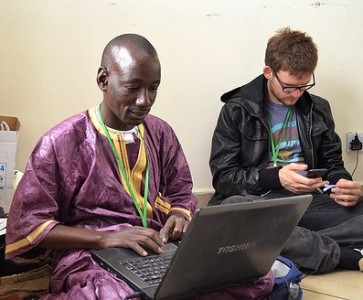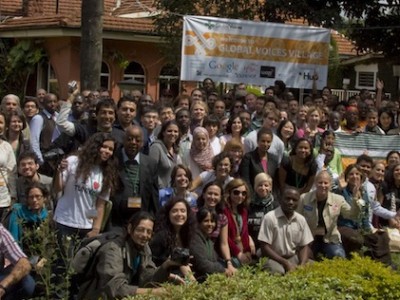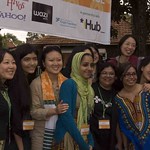The Global Voices Summit 2012 started with a song today in Nairobi, as award-winning Kenyan artist Atemi took to the stage to welcome the 300 plus attendees to the capital.
The Summit is a roughly bi-annual gathering, which brings together bloggers, activists and technologists from around the world for public discussions and workshops about the rise of online citizen media movements worldwide.
After a warm welcome by Daudi Were, founder of the Kenyan Blogs Webring, American media scholar and Global Voices Co-Founder Ethan Zuckerman moderated an international panel on the rise of citizen media.
GV Southeast Asia Editor, Mong Palatino, took us through various social media campaigns from the region, including #thaiflood and Bersih. He explained how an offline/online mix of activism could effect real mobilization and change. Amira al Hussaini, a key Twitter activist from Bahrain, detailed how the Egypt and Tunisia protests last year inspired the Arab region – and in turn the world. WITNESS’s Matisse Bustos Hawkes explained how people share and spread information even where Internet penetration is low, through USB drives, CDs and DVDs. Lastly Pakistan’s Faisal Kapadia voiced concern that we are witnessing the “golden age” of Internet freedom, if we don’t act against censorship now.
Split sessions then followed, one on Kenyan citizen media, which highlighted how online tools and channels are not just airing opinions but affecting how people in the country live (follow #kot on Twitter for the latest Kenyan citizen media buzz). #Occupy Everywhere meanwhile addressed the different global ‘enemies’ but one common goal: liberation and justice. Berkman Center Fellow Zeynep Tufekci moderated a panel on Arab uprisings and how to create effective networks, which helped amplify what was happening on the ground in places like Egypt and Tunisia last year. Some of the challenges of keeping endangered languages alive online were also shared in a session, including issues such as not having a written languages, as well as no letters or fonts on keyboards.
Afternoon ‘unconference’ sessions allowed audience members to suggest and lead discussion groups on a wide range of themes, such as ‘How Facebook spies on you’, #OccupyYourself and current issues in Burma (Myanmar).

Discussion groups at #GV2012
Bob Boorstin from Google, Max Schrems (Europe vs. Facebook) and Ramzi Jaber (onlinecensorship.org) joined GV's Ivan Sigal for the panel ‘Giants of the Internet: What Role and Responsibility?’. The audience was made aware that Facebook declined an invitation to attend, and a Yahoo! representative could not come at the last minute.
Bob Boorstin declared that the Internet is not borderless – that if you cross borders, laws change – and also shared his belief that technological monopolies don't last. Ramzi Jaber announced the launch of onlinecensorship.org, a website on which you can report if your account or content is censored. Ory Okolloh, the original GV Africa editor and a co-founder of Ushahidi who is Google's current Africa policy head, answered an audience question about whether African net users are aware of how to protect their online rights. She spoke about her concerns regarding local capacity and mentioned how she is working with local groups to raise issues.
Wrapping up a great day was the Breaking Borders Award presentation – read a report here.













1 comment
Great Meetup 🙂 i will love this next time too